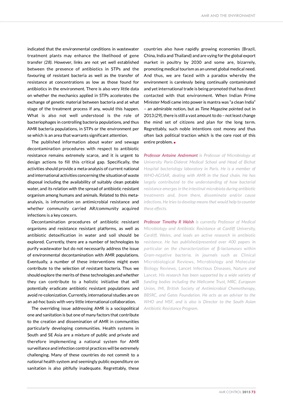
indicated that the environmental conditions in wastewater
treatment plants may enhance the likelihood of gene
transfer (28). However, links are not yet well established
between the presence of antibiotics in STPs and the
favouring of resistant bacteria as well as the transfer of
resistance at concentrations as low as those found for
antibiotics in the environment. There is also very little data
on whether the mechanics applied in STPs accelerates the
exchange of genetic material between bacteria and at what
stage of the treatment process if any, would this happen.
What is also not well understood is the role of
bacteriophages in controlling bacteria populations, and thus
AMR bacteria populations, in STPs or the environment per
se which is an area that warrants significant attention.
The published information about water and sewage
decontamination procedures with respect to antibiotic
resistance remains extremely scarce, and it is urgent to
design actions to fill this critical gap. Specifically, the
activities should provide a meta-analysis of current national
and international activities concerning the situation of waste
disposal including the availability of suitably clean potable
water, and its relation with the spread of antibiotic resistant
organism among humans and animals. Related to this metaanalysis,
is information on antimicrobial resistance and
whether community carried AR/community acquired
infections is a key concern.
Decontamination procedures of antibiotic resistant
organisms and resistance resistant platforms, as well as
antibiotic detoxification in water and soil should be
explored. Currently, there are a number of technologies to
purify wastewater but do not necessarily address the issue
of environmental decontamination with AMR populations.
Eventually, a number of these interventions might even
contribute to the selection of resistant bacteria. Thus we
should explore the merits of these technologies and whether
they can contribute to a holistic initiative that will
potentially eradicate antibiotic resistant populations and
avoid re-colonization. Currently, international studies are on
an ad-hoc basis with very little international collaboration.
The overriding issue addressing AMR is a sociopolitical
one and sanitation is but one of many factors that contribute
to the creation and dissemination of AMR in communities
particularly developing communities. Health systems in
South and SE Asia are a mixture of public and private and
therefore implementing a national system for AMR
surveillance and infection control practices will be extremely
challenging. Many of these countries do not commit to a
national health system and seemingly public expenditure on
sanitation is also pitifully inadequate. Regrettably, these
countries also have rapidly growing economies (Brazil,
China, India and Thailand) and are vying for the global export
market in poultry by 2030 and some are, bizarrely,
promoting medical tourism as an unmet global medical need.
And thus, we are faced with a paradox whereby the
environment is carelessly being continually contaminated
and yet international trade is being promoted that has direct
contacted with that environment. When Indian Prime
Minister Modi came into power is mantra was "a clean India"
- an admirable notion, but as Time Magazine pointed out in
2013 (29), there is still a vast amount to do - not least change
the mind set of citizens and plan for the long term.
Regrettably, such noble intentions cost money and thus
often lack political traction which is the core root of this
entire problem. l
Professor Antoine is Professor of Microbiology at University
Paris-Diderot Medical School and Head of Bichat Hospital
bacteriology laboratory in Paris. He is a member of WHOAGISAR,
dealing with AMR in the food chain. He has largely
contributed to the understanding of how bacterial resistance
emerges in the intestinal microbiota during antibiotic
treatments and, from there, disseminate and/or cause
infections. He tries to develop means that would help to counter
these effects.
Professor Timothy R Walsh is currently Professor of Medical
Microbiology and Antibiotic Resistance at Cardiff University,
Cardiff, Wales, and leads an active research in antibiotic
resistance. He has published/presented over 400 papers in
particular on the characterization of β-lactamases within
Gram-negative bacteria, in journals such as Clinical
Microbiological Reviews, Microbiology and Molecular
Biology Reviews, Lancet Infectious Diseases, Nature and
Lancet. His research has been supported by a wide variety of
funding bodies including the Wellcome Trust, MRC, European
Union, IMI, British Society of Antimicrobial Chemotherapy,
BBSRC, and Gates Foundation. He acts as an advisor to the
WHO and MSF, and is also is Director to the South Asian
Antibiotic Resistance Program. AMR AND THE ENVIRONMENT
AMR CONTROL 2015 73